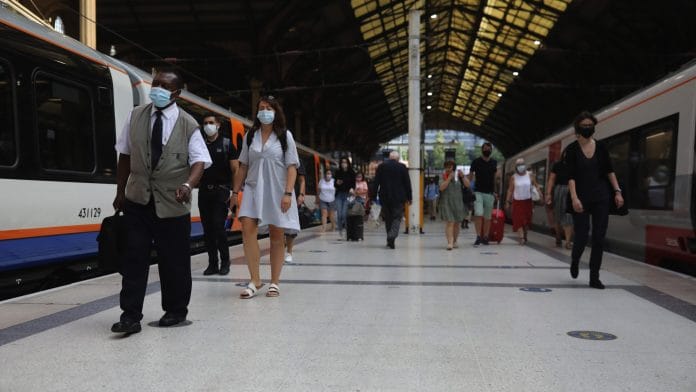Berlin: European leaders from London to Berlin face an alarming reality: lockdowns are creeping back on the agenda as the pandemic threatens the continent again.
It’s a scenario many ruled out after the summer, when coronavirus cases were receding across Europe and borders were re-opening. A resurgence was expected but the conviction was that a targeted approach would do.
In the U.K., the fear is that a two-week lockdown now is not enough.
That early sense of victory has given way to disappointment, and set the stage for a deeper crisis with major cities under curfew and central governments openly clashing with local officials on the way forward.
“The hope was that the second wave would be easier to control because we know how to identify and contain clusters and keep the economy running,” said Christian Odendahl, chief economist at the Centre for European Reform. “But that has not worked in Europe.”
Thursday unleashed a fresh wave of bad news, as one country after another posted record daily infections. Hospitalization and death rates ticked up across the region.
Leaders have less leverage to fight now, having burned political capital to shut down and then prop up economies when the pandemic erupted in the spring.
Businesses are more wobbly, the public is fed up with a dizzying array of “lockdown lite” restrictions, and political opposition is no longer sitting back. There’s an ideological fight at play too between libertarians who don’t want to restrict movement and those who say safety should trump all other concerns, including the economy.
It’s a much harder balance to strike this time round. For Jamie Rush of Bloomberg Economics “doing too little to contain the spread could easily end up costing more than a short national lockdown.”
Even a Two-Week U.K. Lockdown May Not Be Enough, Officials Fear
Spain’s Socialist government is battling with center-right authorities in Madrid, British Prime Minister Boris Johnson is beset on all sides. His handling of the pandemic is costing him support in northern England, where he made rare gains in last year’s election. Now, it’s among the most affected regions in the U.K.
Even Chancellor Angela Merkel — Europe’s queen of crises — failed to prod Germany’s state leaders to accept tougher measures during an eight-hour negotiating marathon this week.
All this casts into doubt any rebound from the region’s worst recession in living memory. It will force governments to increase spending, further squeezing public finances. Central banks, which have deployed unprecedented stimulus, are gearing up to do more.
Europe’s initial strategy was a shock treatment that suspended personal liberties to get back to some type of normal as soon as possible. It seemed to be working. Job losses had been kept in check, thanks to generous stimulus packages.
But authorities, despite bulking up on testing, failed to enforce hygiene restrictions or self-isolation rules after lifting lockdowns. Over the summer, people traveled and brought the virus back home. The spread has accelerated as cooler weather forces people indoors, setting the stage for a winter of toil.
Outbreaks have spurred a new round of curbs. Starting this weekend, Londoners will be banned from mixing with other households, and residents of Paris and other major French cities will be confined to their homes at night for four weeks.
Also read: Europe sharpens restrictions to contain surging coronavirus cases
Fear factor
Even if restrictions don’t have a huge direct impact on economic activity, the associated fear factor could hurt spending.
Kate Nicholls, chief executive of UKHospitality, the industry body for a wide range of leisure businesses, described the situation as being “trapped in a no man’s land of being open, but with severe restrictions that will significantly hit custom.”
The rise in cases has also alarmed scientists pressing for more stringent policies.
In the U.K., public-health experts have called for a “circuit-breaker” — a quick-fire shutdown of businesses and social contact to coincide with a school break. Even there, the concern is that it’s too late to make an impact.
Meanwhile, various attempts to control the virus are breaking down, with testing and tracking systems in danger of becoming overwhelmed.
The Czech Republic — the worst outbreak in Europe — is now equipping hotels and spas as emergency health facilities.
Further complicating efforts to rally people is the fact that there’s no end in sight. A vaccine won’t likely be widely available before well into 2021, and public unrest is flickering.
In the southern Italian town of Arzano, a lockdown that closed all shops except those selling the essentials prompted several dozen shopkeepers to block a main road, joining other protests across the region. In the region surrounding Naples, schools are reportedly shutting down until the end of the month.
Any leader observing how compliance is breaking down has to wonder what tools, if any, they have left.
-With assistance from Zoe Schneeweiss, Tim Loh, Todd Gillespie, John Follain, Ania Nussbaum, Raymond Colitt, Lenka Ponikelska and Deirdre Hipwell. -Bloomberg
Also read: UK set for more restrictions, tiered alert levels as Covid cases mount






